Frequent persons on Bosnia-herzegovina's street signs
countries
114 names / 523 streets
Nikola Tesla
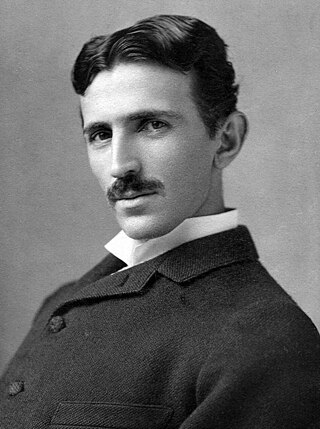 16
Nikola Tesla was a Serbian-American inventor, electrical engineer, mechanical engineer, and futurist. He is known for his contributions to the design of the modern alternating current (AC)...
16
Nikola Tesla was a Serbian-American inventor, electrical engineer, mechanical engineer, and futurist. He is known for his contributions to the design of the modern alternating current (AC)...
Petar II Petrović-Njegoš
 15
Petar II Petrović-Njegoš, commonly referred to simply as Njegoš (Његош), was a Prince-Bishop (vladika) of Montenegro, poet and philosopher whose works are widely considered some of the most important...
15
Petar II Petrović-Njegoš, commonly referred to simply as Njegoš (Његош), was a Prince-Bishop (vladika) of Montenegro, poet and philosopher whose works are widely considered some of the most important...
Stefan Dušan
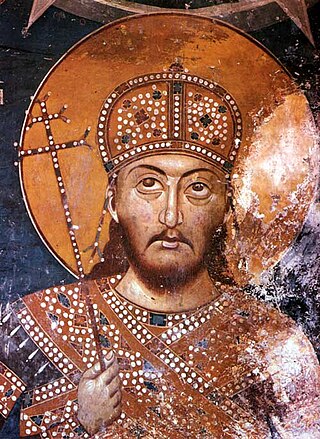 13
Stefan Uroš IV Dušan, also known as Dušan the Mighty, was the king of Serbia from 8 September 1331 and tsar and autocrat of the Serbs, Greeks, Albanians and Bulgarians from 16 April 1346 until his...
13
Stefan Uroš IV Dušan, also known as Dušan the Mighty, was the king of Serbia from 8 September 1331 and tsar and autocrat of the Serbs, Greeks, Albanians and Bulgarians from 16 April 1346 until his...
Karađorđe
 13
Đorđe Petrović, known by the sobriquet Karađorđe, was a Serbian revolutionary who led the struggle for his country's independence from the Ottoman Empire during the First Serbian Uprising. He held...
13
Đorđe Petrović, known by the sobriquet Karađorđe, was a Serbian revolutionary who led the struggle for his country's independence from the Ottoman Empire during the First Serbian Uprising. He held...
Petar Kočić
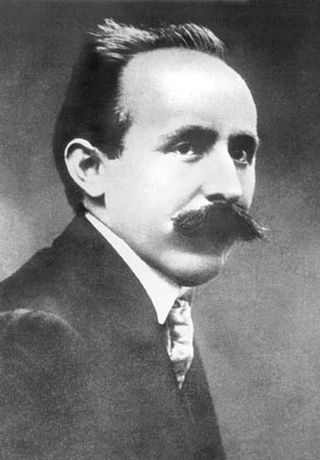 13
Petar Kočić was a Bosnian Serb writer, activist and politician. Born in rural northwestern Bosnia in the final days of Ottoman rule, Kočić began writing around the turn of the twentieth century,...
13
Petar Kočić was a Bosnian Serb writer, activist and politician. Born in rural northwestern Bosnia in the final days of Ottoman rule, Kočić began writing around the turn of the twentieth century,...
Lazar of Serbia
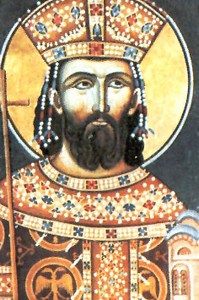 12
Lazar Hrebeljanović was a medieval Serbian ruler who created the largest and most powerful state on the territory of the disintegrated Serbian Empire. Lazar's state, referred to by historians as...
12
Lazar Hrebeljanović was a medieval Serbian ruler who created the largest and most powerful state on the territory of the disintegrated Serbian Empire. Lazar's state, referred to by historians as...
Ivo Andrić
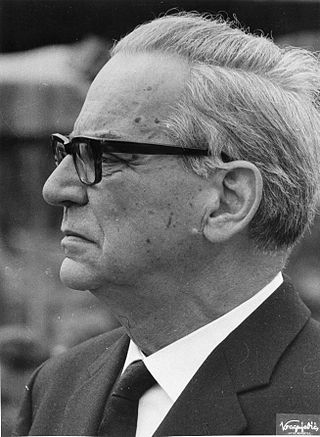 12
Ivo Andrić was a Yugoslav novelist, poet and short story writer who won the Nobel Prize in Literature in 1961. His writings dealt mainly with life in his native Bosnia under Ottoman rule.
12
Ivo Andrić was a Yugoslav novelist, poet and short story writer who won the Nobel Prize in Literature in 1961. His writings dealt mainly with life in his native Bosnia under Ottoman rule.
Starina Novak
 12
Starina Novak was a Serb hajduk who distinguished himself in many battles against the Ottoman Empire. He is considered a national hero by both the Serbs and the Romanians.
12
Starina Novak was a Serb hajduk who distinguished himself in many battles against the Ottoman Empire. He is considered a national hero by both the Serbs and the Romanians.
Uz Maršala Tita
 11
Uz Maršala Tita is a Yugoslav Partisan anthem about the leader of the country's liberation movement in World War II, Josip Broz Tito, written by Vladimir Nazor and composed by Oskar Danon.
11
Uz Maršala Tita is a Yugoslav Partisan anthem about the leader of the country's liberation movement in World War II, Josip Broz Tito, written by Vladimir Nazor and composed by Oskar Danon.
Saint Sava
 11
Saint Sava, known as the Enlightener, was a Serbian prince and Orthodox monk, the first Archbishop of the autocephalous Serbian Church, the founder of Serbian law, and a diplomat. Sava, born as...
11
Saint Sava, known as the Enlightener, was a Serbian prince and Orthodox monk, the first Archbishop of the autocephalous Serbian Church, the founder of Serbian law, and a diplomat. Sava, born as...
Jovan Dučić
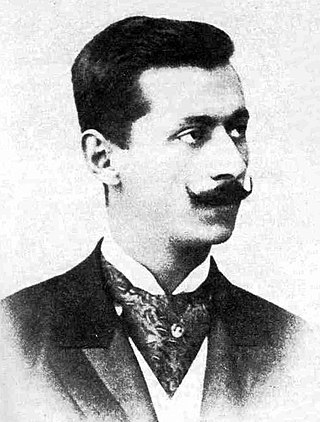 11
Jovan Dučić was a Serb poet-diplomat and academic.
11
Jovan Dučić was a Serb poet-diplomat and academic.
Vuk Karadžić
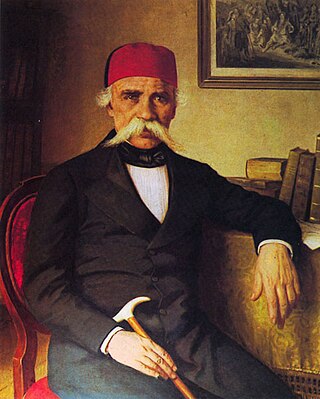 11
Vuk Stefanović Karadžić was a Serbian philologist, anthropologist and linguist. He was one of the most important reformers of the modern Serbian language. For his collection and preservation of...
11
Vuk Stefanović Karadžić was a Serbian philologist, anthropologist and linguist. He was one of the most important reformers of the modern Serbian language. For his collection and preservation of...
Miloš Obilić
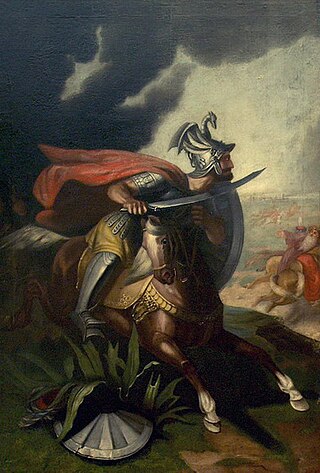 10
Miloš Obilić was a legendary Serbian knight who is reputed to have been in the service of Prince Lazar during the Ottoman invasion of Serbia in the late 14th century. He is not mentioned in...
10
Miloš Obilić was a legendary Serbian knight who is reputed to have been in the service of Prince Lazar during the Ottoman invasion of Serbia in the late 14th century. He is not mentioned in...
Tomislav of Croatia
 10
Tomislav was the first king of Croatia. He became Duke of Croatia c. 910 and was crowned king in 925, reigning until 928. During Tomislav's rule, Croatia forged an alliance with the Byzantine Empire...
10
Tomislav was the first king of Croatia. He became Duke of Croatia c. 910 and was crowned king in 925, reigning until 928. During Tomislav's rule, Croatia forged an alliance with the Byzantine Empire...
Stjepan Radić
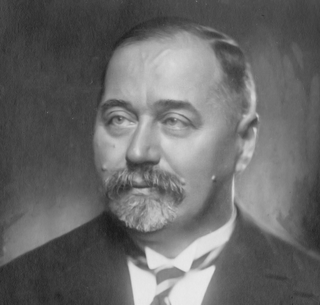 9
Stjepan Radić was a Croat politician and founder of the Croatian People's Peasant Party (HPSS), active in Austria-Hungary and the Kingdom of Serbs, Croats and Slovenes.
9
Stjepan Radić was a Croat politician and founder of the Croatian People's Peasant Party (HPSS), active in Austria-Hungary and the Kingdom of Serbs, Croats and Slovenes.
Meša Selimović
 9
Mehmed "Meša" Selimović was a Yugoslav writer, whose novel Death and the Dervish is one of the most important literary works in post-World War II Yugoslavia. Some of the main themes in his works are...
9
Mehmed "Meša" Selimović was a Yugoslav writer, whose novel Death and the Dervish is one of the most important literary works in post-World War II Yugoslavia. Some of the main themes in his works are...
Aleksa Šantić
Gavrilo Princip
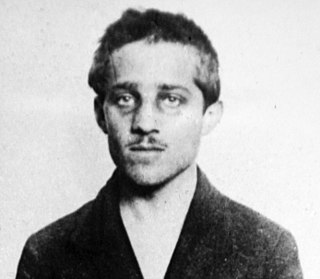 9
Gavrilo Princip was a Bosnian Serb student who assassinated Archduke Franz Ferdinand, heir presumptive to the throne of Austria-Hungary, and his wife Sophie, Duchess von Hohenberg, in Sarajevo on 28...
9
Gavrilo Princip was a Bosnian Serb student who assassinated Archduke Franz Ferdinand, heir presumptive to the throne of Austria-Hungary, and his wife Sophie, Duchess von Hohenberg, in Sarajevo on 28...
Ban Kulin
 8
Kulin was the Ban of Bosnia from 1180 to 1204, first as a vassal of the Byzantine Empire and then of the Kingdom of Hungary, although his state was de facto independent. He was one of Bosnia's most...
8
Kulin was the Ban of Bosnia from 1180 to 1204, first as a vassal of the Byzantine Empire and then of the Kingdom of Hungary, although his state was de facto independent. He was one of Bosnia's most...
Alija Izetbegović
 8
Alija Izetbegović was a Bosnian politician, Islamic philosopher and author, who in 1992 became the first president of the Presidency of the newly independent Republic of Bosnia and Herzegovina. He...
8
Alija Izetbegović was a Bosnian politician, Islamic philosopher and author, who in 1992 became the first president of the Presidency of the newly independent Republic of Bosnia and Herzegovina. He...
Nikola Pašić
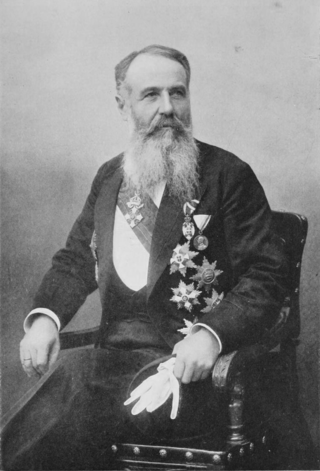 8
Nikola Pašić was a Serbian and Yugoslav politician and diplomat. During his political career, which spanned almost five decades, he served five times as prime minister of Serbia and three times as...
8
Nikola Pašić was a Serbian and Yugoslav politician and diplomat. During his political career, which spanned almost five decades, he served five times as prime minister of Serbia and three times as...
Živojin Mišić
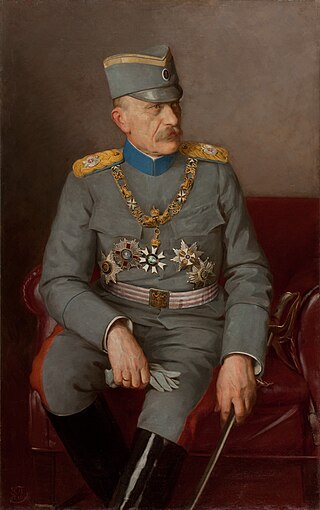 8
Živojin Mišić was a field marshal who participated in all of Serbia's wars from 1876 to 1918. He directly commanded the First Serbian army in the Battle of Kolubara and in breach of the Thessaloniki...
8
Živojin Mišić was a field marshal who participated in all of Serbia's wars from 1876 to 1918. He directly commanded the First Serbian army in the Battle of Kolubara and in breach of the Thessaloniki...
Branko Radičević
 8
Aleksije "Branko" Radičević was a Serbian poet who wrote in the period of Romanticism.
8
Aleksije "Branko" Radičević was a Serbian poet who wrote in the period of Romanticism.
Radomir Putnik
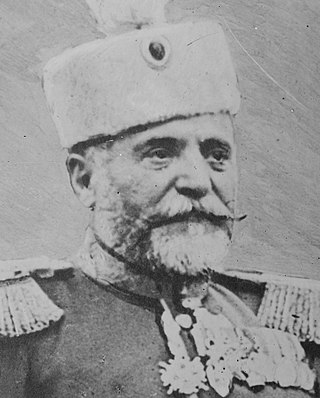 7
Radomir Putnik was the first Serbian Field Marshal and Chief of the General Staff of the Serbian army in the Balkan Wars and in the First World War. He served in every war in which Serbia fought from...
7
Radomir Putnik was the first Serbian Field Marshal and Chief of the General Staff of the Serbian army in the Balkan Wars and in the First World War. He served in every war in which Serbia fought from...
Princess Milica of Serbia
 7
Princess Milica Hrebeljanović née Nemanjić also known as Empress (Tsaritsa) Milica, was a royal consort of Serbia by marriage to Prince Lazar who fell in the Battle of Kosovo. After her husband's...
7
Princess Milica Hrebeljanović née Nemanjić also known as Empress (Tsaritsa) Milica, was a royal consort of Serbia by marriage to Prince Lazar who fell in the Battle of Kosovo. After her husband's...
Stevan Sinđelić
 7
Stevan Sinđelić was a Serbian revolutionary commander in Resava, who fought during the First Serbian Uprising (1804–1813) against Ottoman rule. As the commander of the Resava Brigade, he fought in...
7
Stevan Sinđelić was a Serbian revolutionary commander in Resava, who fought during the First Serbian Uprising (1804–1813) against Ottoman rule. As the commander of the Resava Brigade, he fought in...
Branko Ćopić
 7
Branko Ćopić was a Yugoslav writer. He wrote poetry, short stories and novels, and became famous for his stories for children and young adults, often set during World War II in revolutionary...
7
Branko Ćopić was a Yugoslav writer. He wrote poetry, short stories and novels, and became famous for his stories for children and young adults, often set during World War II in revolutionary...
Stefan Nemanja
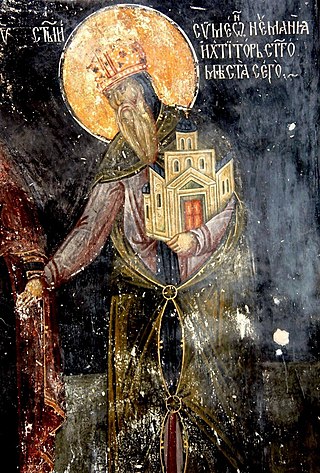 7
Stefan Nemanja was the Grand Prince of the Serbian Grand Principality from 1166 to 1196. A member of the Vukanović dynasty, Nemanja founded the Nemanjić dynasty, and is remembered for his...
7
Stefan Nemanja was the Grand Prince of the Serbian Grand Principality from 1166 to 1196. A member of the Vukanović dynasty, Nemanja founded the Nemanjić dynasty, and is remembered for his...
Jovan Jovanović Zmaj
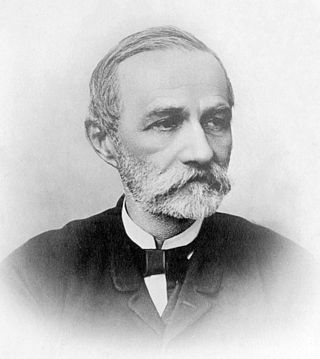 7
Jovan Jovanović Zmaj was a Serbian poet.
7
Jovan Jovanović Zmaj was a Serbian poet.
Filip Višnjić
 7
Filip Višnjić was a Serbian epic poet and guslar. His repertoire included 13 original epic poems chronicling the First Serbian Uprising against the Ottoman Empire and four reinterpreted epics from...
7
Filip Višnjić was a Serbian epic poet and guslar. His repertoire included 13 original epic poems chronicling the First Serbian Uprising against the Ottoman Empire and four reinterpreted epics from...
Peter I of Serbia
 6
Peter I was King of Serbia from 15 June 1903 to 1 December 1918. On 1 December 1918, he became King of the Serbs, Croats and Slovenes, and he held that title until his death three years later. Since...
6
Peter I was King of Serbia from 15 June 1903 to 1 December 1918. On 1 December 1918, he became King of the Serbs, Croats and Slovenes, and he held that title until his death three years later. Since...
Mihajlo Pupin
 6
Mihajlo Idvorski Pupin, also known as Michael Pupin, was a Serbian physicist, physical chemist and philanthropist based in the United States.
6
Mihajlo Idvorski Pupin, also known as Michael Pupin, was a Serbian physicist, physical chemist and philanthropist based in the United States.
Vasa Pelagić
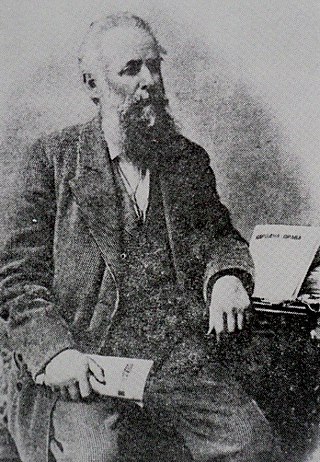 6
Vasilije "Vasa" Pelagić was a Bosnian Serb writer, physician, educator, clergyman, nationalist and a proponent of utopian socialism among the Serbs in the second half of the nineteenth century. Today...
6
Vasilije "Vasa" Pelagić was a Bosnian Serb writer, physician, educator, clergyman, nationalist and a proponent of utopian socialism among the Serbs in the second half of the nineteenth century. Today...
Đura Jakšić
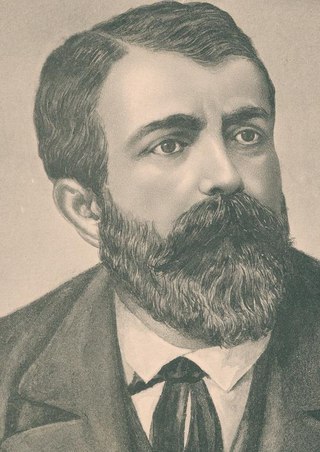 6
Georgije "Đura" Jakšić was a Serbian poet, painter, writer, dramatist and bohemian.
6
Georgije "Đura" Jakšić was a Serbian poet, painter, writer, dramatist and bohemian.
Roger Joseph Boscovich
 5
Roger Joseph Boscovich was a physicist, astronomer, mathematician, philosopher, diplomat, poet, theologian, Jesuit priest, and a polymath from the Republic of Ragusa. He studied and lived in Italy...
5
Roger Joseph Boscovich was a physicist, astronomer, mathematician, philosopher, diplomat, poet, theologian, Jesuit priest, and a polymath from the Republic of Ragusa. He studied and lived in Italy...
Tvrtko I of Bosnia
 5
Stephen Tvrtko I was the first king of Bosnia. A member of the House of Kotromanić, he succeeded his uncle Stephen II as the ban of Bosnia in 1353. As he was a minor at the time, Tvrtko's father,...
5
Stephen Tvrtko I was the first king of Bosnia. A member of the House of Kotromanić, he succeeded his uncle Stephen II as the ban of Bosnia in 1353. As he was a minor at the time, Tvrtko's father,...
Catherine of Bosnia
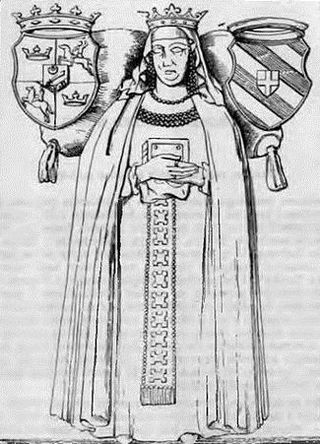 5
Catherine of Bosnia was Queen of Bosnia as the wife of King Thomas, the penultimate Bosnian sovereign. She was born into the powerful House of Kosača, staunch supporters of the Bosnian Church. Her...
5
Catherine of Bosnia was Queen of Bosnia as the wife of King Thomas, the penultimate Bosnian sovereign. She was born into the powerful House of Kosača, staunch supporters of the Bosnian Church. Her...
Musa Ćazim Ćatić
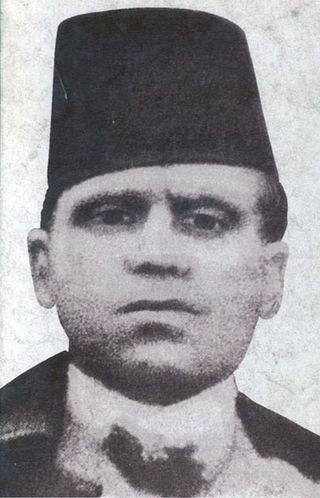 5
Musa Ćazim Ćatić was a Bosnian poet of the Bosnian-Herzegovinian Renaissance at the turn of the 20th century.
5
Musa Ćazim Ćatić was a Bosnian poet of the Bosnian-Herzegovinian Renaissance at the turn of the 20th century.
Desanka Maksimović
 5
Desanka Maksimović was a Serbian poet, writer and translator. Her first works were published in the literary journal Misao in 1920, while she was studying at the University of Belgrade. Within a few...
5
Desanka Maksimović was a Serbian poet, writer and translator. Her first works were published in the literary journal Misao in 1920, while she was studying at the University of Belgrade. Within a few...
Miloš Crnjanski
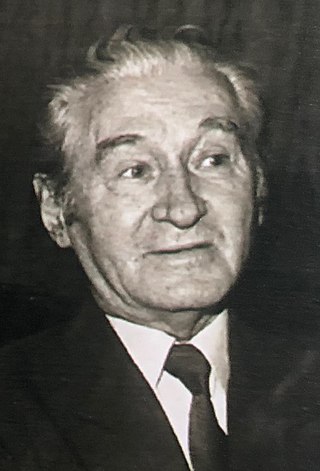 5
Miloš Crnjanski was a Serbian writer and poet of the expressionist wing of Serbian modernism, author, and a diplomat.
5
Miloš Crnjanski was a Serbian writer and poet of the expressionist wing of Serbian modernism, author, and a diplomat.
Jugović brothers
 4
The Jugovic brothers, or Nine Jugović, commonly known as the Jugovići, the nine sons of Jug Bogdan, are popular mythological characters of Serbian epic poetry. In poems, the Jugović brothers and...
4
The Jugovic brothers, or Nine Jugović, commonly known as the Jugovići, the nine sons of Jug Bogdan, are popular mythological characters of Serbian epic poetry. In poems, the Jugović brothers and...
Branislav Nušić
 4
Branislav Nušić was a Serbian playwright, satirist, essayist, novelist and founder of modern rhetoric in Serbia. He also worked as a journalist and a civil servant.
4
Branislav Nušić was a Serbian playwright, satirist, essayist, novelist and founder of modern rhetoric in Serbia. He also worked as a journalist and a civil servant.
Jovan Cvijić
 4
Jovan Cvijić was a Serbian geographer and ethnologist, president of the Serbian Royal Academy of Sciences and rector of the University of Belgrade. Cvijić is considered the founder of geography in...
4
Jovan Cvijić was a Serbian geographer and ethnologist, president of the Serbian Royal Academy of Sciences and rector of the University of Belgrade. Cvijić is considered the founder of geography in...
Jovan Rašković
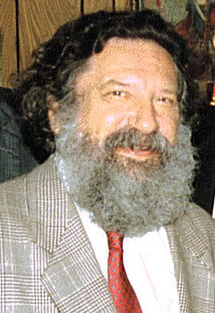 4
Jovan Rašković was a Croatian Serb psychiatrist, academic and politician.
4
Jovan Rašković was a Croatian Serb psychiatrist, academic and politician.
Nadežda Petrović
 4
Nadežda Petrović was a Serbian painter and one of the women war photography pioneers in the region. Considered Serbia's most famous expressionist and fauvist, she was the most important Serbian...
4
Nadežda Petrović was a Serbian painter and one of the women war photography pioneers in the region. Considered Serbia's most famous expressionist and fauvist, she was the most important Serbian...
Vratko Nemanjić
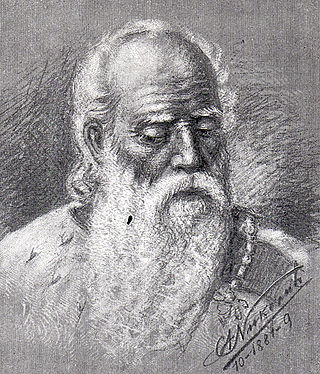 3
Vratko Nemanjić was a Serbian noble, father of Prince Lazar's spouse Milica. Serbian epic poetry identifies him with Jug Bogdan or Ljutica Bogdan, a mythical hero in the Battle of Kosovo.
3
Vratko Nemanjić was a Serbian noble, father of Prince Lazar's spouse Milica. Serbian epic poetry identifies him with Jug Bogdan or Ljutica Bogdan, a mythical hero in the Battle of Kosovo.
Safvet-beg Bašagić
 3
Dr. Safvet-beg Bašagić, also known as Mirza Safvet, was a Bosnian writer who is often described by Bosniak historians as the "father of Bosnian Renaissance", and one of the most renowned poets of...
3
Dr. Safvet-beg Bašagić, also known as Mirza Safvet, was a Bosnian writer who is often described by Bosniak historians as the "father of Bosnian Renaissance", and one of the most renowned poets of...
Ilija Garašanin
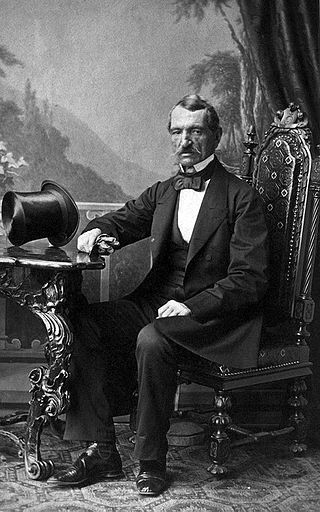 3
Ilija Garašanin was a Serbian statesman who served as the prime minister of Serbia between 1852 and 1853 and again from 1861 to 1867.
3
Ilija Garašanin was a Serbian statesman who served as the prime minister of Serbia between 1852 and 1853 and again from 1861 to 1867.
Grgo Martić
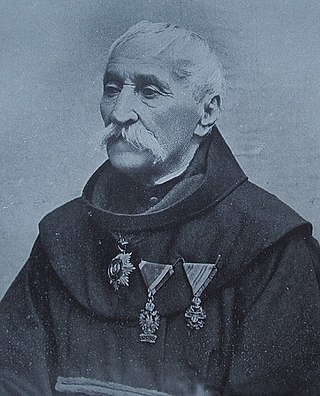 3
Grgo Martić, also known as Grga or Mato Martić, was a Bosnian friar, writer, and translator in the Franciscan Province of Bosna Srebrena.
3
Grgo Martić, also known as Grga or Mato Martić, was a Bosnian friar, writer, and translator in the Franciscan Province of Bosna Srebrena.
Miroslav Krleža
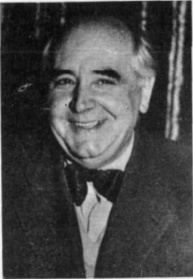 3
Miroslav Krleža was a Yugoslav and Croatian writer who is widely considered to be the greatest Croatian writer of the 20th century. He wrote notable works in all the literary genres, including...
3
Miroslav Krleža was a Yugoslav and Croatian writer who is widely considered to be the greatest Croatian writer of the 20th century. He wrote notable works in all the literary genres, including...
Jovan Bijelić
 3
Jovan Bijelić (Serbian Cyrillic: Јован Бијелић was a painter and academic. Bijelić is one of the most important representatives of color expressionism in Yugoslavia.
3
Jovan Bijelić (Serbian Cyrillic: Јован Бијелић was a painter and academic. Bijelić is one of the most important representatives of color expressionism in Yugoslavia.
Alexander I of Yugoslavia
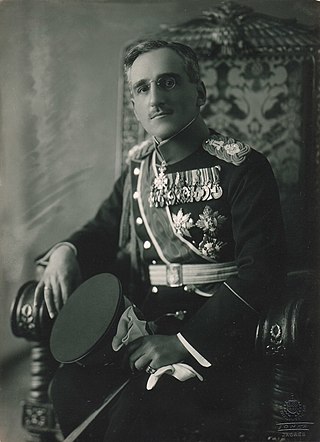 3
Alexander I, also known as Alexander the Unifier, was King of the Serbs, Croats and Slovenes from 16 August 1921 to 3 October 1929 and King of Yugoslavia from 3 October 1929 until his assassination...
3
Alexander I, also known as Alexander the Unifier, was King of the Serbs, Croats and Slovenes from 16 August 1921 to 3 October 1929 and King of Yugoslavia from 3 October 1929 until his assassination...
Mladen Stojanović
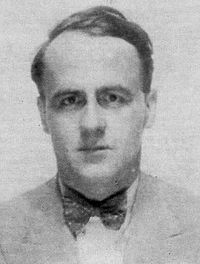 3
Mladen Stojanović was a Bosnian Serb and Yugoslav physician who led a detachment of Partisans on and around Mount Kozara in northwestern Bosnia during World War II in Yugoslavia. He was posthumously...
3
Mladen Stojanović was a Bosnian Serb and Yugoslav physician who led a detachment of Partisans on and around Mount Kozara in northwestern Bosnia during World War II in Yugoslavia. He was posthumously...
Diva Grabovčeva
 3
Diva Grabovčeva is a legendary figure in the folklore of Bosnian Catholic people, portrayed as a virgin martyr.
3
Diva Grabovčeva is a legendary figure in the folklore of Bosnian Catholic people, portrayed as a virgin martyr.
Tin Ujević
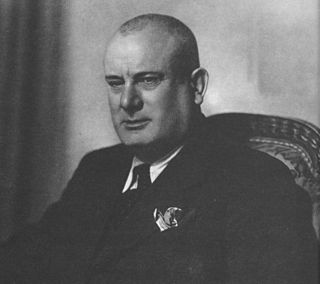 3
Augustin Josip "Tin" Ujević was a Croatian poet, considered by many to be the greatest poet in 20th century Croatian literature.
3
Augustin Josip "Tin" Ujević was a Croatian poet, considered by many to be the greatest poet in 20th century Croatian literature.
Cabinet of Karađorđe Petrović
 3
The cabinet of Đorđe Petrović, more commonly known as Karađorđe, was formed on 11 January 1811. It held office until 3 October 1813, when Karađorđe fled to the Austrian Empire after the defeat of...
3
The cabinet of Đorđe Petrović, more commonly known as Karađorđe, was formed on 11 January 1811. It held office until 3 October 1813, when Karađorđe fled to the Austrian Empire after the defeat of...
Mak Dizdar
 3
Mehmedalija "Mak" Dizdar was a Bosnian poet. His poetry combined influences from the Bosnian Christian culture, Islamic mysticism and cultural remains of medieval Bosnia, and especially the stećci.
3
Mehmedalija "Mak" Dizdar was a Bosnian poet. His poetry combined influences from the Bosnian Christian culture, Islamic mysticism and cultural remains of medieval Bosnia, and especially the stećci.
Strahinja Banović
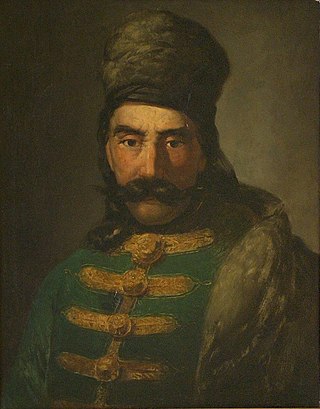 3
Strahinja Banović or Strahinjić Ban is the name of the nobleman and knight depicted in the Serbian epic poem of the same title. It is unsure whether or not he existed; however, some historians...
3
Strahinja Banović or Strahinjić Ban is the name of the nobleman and knight depicted in the Serbian epic poem of the same title. It is unsure whether or not he existed; however, some historians...
Isidora Sekulić
 3
Isidora Sekulić was a Serbian writer, novelist, essayist, polyglot and art critic. She was "the first woman academic in the history of Serbia" after she joined the Serbian Academy of Sciences and...
3
Isidora Sekulić was a Serbian writer, novelist, essayist, polyglot and art critic. She was "the first woman academic in the history of Serbia" after she joined the Serbian Academy of Sciences and...
Pavle, Serbian Patriarch
 3
Pavle was the patriarch of the Serbian Orthodox Church from 1990 to his death. His full title was His Holiness the Archbishop of Peć, Metropolitan of Belgrade and Karlovci, and Serbian Patriarch...
3
Pavle was the patriarch of the Serbian Orthodox Church from 1990 to his death. His full title was His Holiness the Archbishop of Peć, Metropolitan of Belgrade and Karlovci, and Serbian Patriarch...
Dositej Obradović
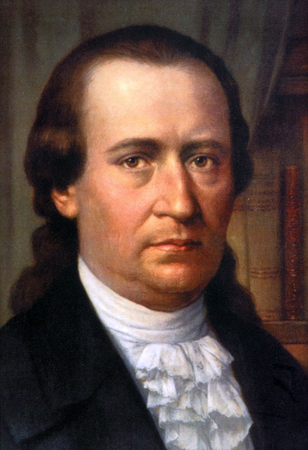 3
Dositej Obradović was a Serbian writer, biographer, diarist, philosopher, pedagogue, educational reformer, linguist, polyglot and the first minister of education of Serbia. An influential protagonist...
3
Dositej Obradović was a Serbian writer, biographer, diarist, philosopher, pedagogue, educational reformer, linguist, polyglot and the first minister of education of Serbia. An influential protagonist...
Đuro Daničić
 2
Đuro Daničić, born Đorđe Popović and also known as Đura Daničić, was a Serbian philologist, translator, linguistic historian and lexicographer. He was a prolific scholar at the Belgrade Lyceum.
2
Đuro Daničić, born Đorđe Popović and also known as Đura Daničić, was a Serbian philologist, translator, linguistic historian and lexicographer. He was a prolific scholar at the Belgrade Lyceum.
Džemal Bijedić
 2
Džemal Bijedić was a Bosnian and Yugoslav politician who served as Prime Minister of Yugoslavia from July 1971 until his death in a plane crash in January 1977. He additionally served as Secretary of...
2
Džemal Bijedić was a Bosnian and Yugoslav politician who served as Prime Minister of Yugoslavia from July 1971 until his death in a plane crash in January 1977. He additionally served as Secretary of...
Ivan Goran Kovačić
 2
Ivan Goran Kovačić was a Croatian poet and writer.
2
Ivan Goran Kovačić was a Croatian poet and writer.
Skender Kulenović
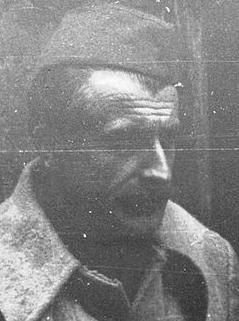 2
Skender Kulenović was a Bosnian poet, novelist and dramatist.
2
Skender Kulenović was a Bosnian poet, novelist and dramatist.
Josif Pančić
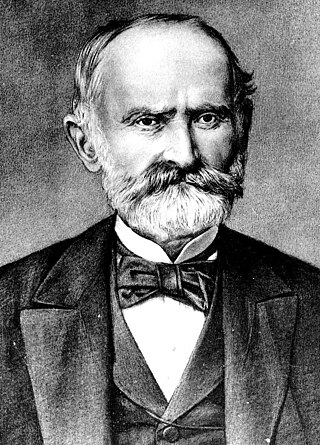 2
Josif Pančić was a Serbian botanist, a doctor of medicine, a lecturer at the Great School, and the first president of the Serbian Royal Academy. He extensively documented the flora of Serbia, and is...
2
Josif Pančić was a Serbian botanist, a doctor of medicine, a lecturer at the Great School, and the first president of the Serbian Royal Academy. He extensively documented the flora of Serbia, and is...
Sava Kovačević
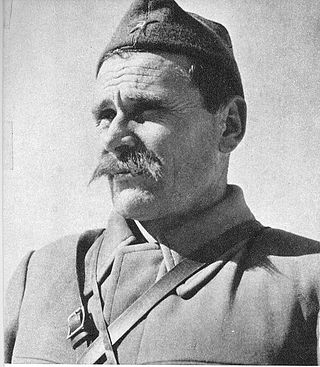 2
Sava Kovačević was a Yugoslav Partisan divisional commander during World War II, and one of the heroes of the communist Partisan movement.
2
Sava Kovačević was a Yugoslav Partisan divisional commander during World War II, and one of the heroes of the communist Partisan movement.
Mijat Tomić
 2
Mijat Tomić was a hajduk who led brigands which fought against Ottoman Empire rule in present-day Bosnia and Herzegovina.
2
Mijat Tomić was a hajduk who led brigands which fought against Ottoman Empire rule in present-day Bosnia and Herzegovina.
Demetrius Zvonimir
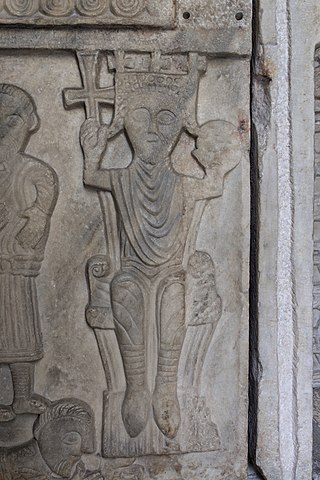 2
Demetrius Zvonimir was a King of Croatia and Dalmatia from 1075 or 1076 until his death in 1089. Zvonimir also served as Ban of Croatia (1064–1074), and was named Duke of Croatia in around 1075. His...
2
Demetrius Zvonimir was a King of Croatia and Dalmatia from 1075 or 1076 until his death in 1089. Zvonimir also served as Ban of Croatia (1064–1074), and was named Duke of Croatia in around 1075. His...
Stephen Tomašević of Bosnia
 2
Stephen Tomašević or Stephen II was the last sovereign from the Bosnian Kotromanić dynasty, reigning as Despot of Serbia briefly in 1459 and as King of Bosnia from 1461 until 1463.
2
Stephen Tomašević or Stephen II was the last sovereign from the Bosnian Kotromanić dynasty, reigning as Despot of Serbia briefly in 1459 and as King of Bosnia from 1461 until 1463.
Hamdija Kreševljaković
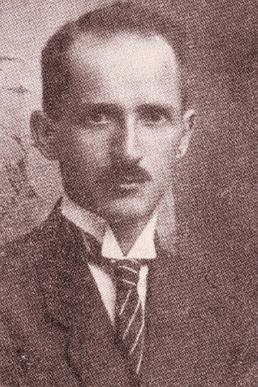 2
Hamdija Kreševljaković was a Bosnian and Yugoslav historian.
2
Hamdija Kreševljaković was a Bosnian and Yugoslav historian.
Džemaludin Čaušević
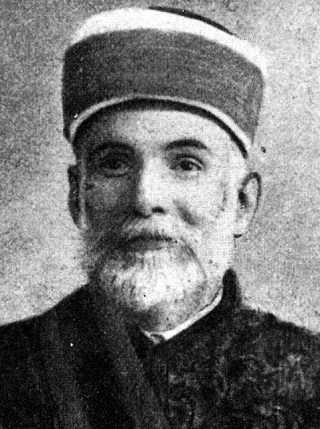 2
Mehmed Džemaludin Effendi Čaušević was a Bosnian Muslim theologian, thinker, educator, reformer, journalist, translator and linguist, the fourth Grand Mufti (Reis-ul-Ulema) in the period of the...
2
Mehmed Džemaludin Effendi Čaušević was a Bosnian Muslim theologian, thinker, educator, reformer, journalist, translator and linguist, the fourth Grand Mufti (Reis-ul-Ulema) in the period of the...
Mate Boban
 2
Mate Boban was a Bosnian Croat politician and one of the founders of the Croatian Republic of Herzeg-Bosnia, an unrecognized entity within Bosnia and Herzegovina. He was the first president of...
2
Mate Boban was a Bosnian Croat politician and one of the founders of the Croatian Republic of Herzeg-Bosnia, an unrecognized entity within Bosnia and Herzegovina. He was the first president of...
Aloysius Stepinac
 2
Aloysius Viktor Stepinac was a high-ranking Yugoslav Croat prelate of the Catholic Church. Made a cardinal in 1953, Stepinac served as Archbishop of Zagreb from 1937 until his death, a period which...
2
Aloysius Viktor Stepinac was a high-ranking Yugoslav Croat prelate of the Catholic Church. Made a cardinal in 1953, Stepinac served as Archbishop of Zagreb from 1937 until his death, a period which...
Симо Шолаја
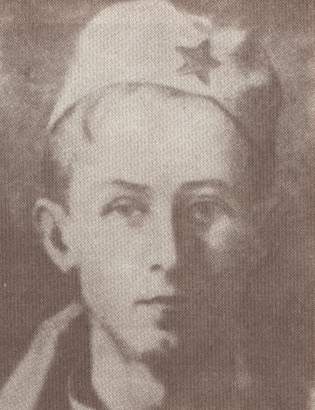 2
Симела Симо Шолаја, учесник Народноослободилачке борбе и народни херој Југославије.
2
Симела Симо Шолаја, учесник Народноослободилачке борбе и народни херој Југославије.
Sava Mrkalj
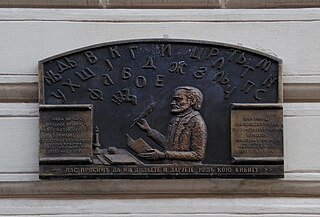 2
Sava Mrkalj was a Serb linguist, grammarian, philologist, and poet known for his attempt to reform the Serbian language before Vuk Karadžić.
2
Sava Mrkalj was a Serb linguist, grammarian, philologist, and poet known for his attempt to reform the Serbian language before Vuk Karadžić.
Josip Jelačić
 2
Count Josip Jelačić von Bužim was a Croatian lieutenant field marshal in the Imperial Austrian Army and politician. He was the Ban of Croatia between 23 March 1848 and 19 April 1859. He was a member...
2
Count Josip Jelačić von Bužim was a Croatian lieutenant field marshal in the Imperial Austrian Army and politician. He was the Ban of Croatia between 23 March 1848 and 19 April 1859. He was a member...
Marko Marulić
 2
Marko Marulić Splićanin, was a Croatian poet, lawyer, judge, and Renaissance humanist who coined the term "psychology". He is the national poet of Croatia. According to George J. Gutsche, Marulic's...
2
Marko Marulić Splićanin, was a Croatian poet, lawyer, judge, and Renaissance humanist who coined the term "psychology". He is the national poet of Croatia. According to George J. Gutsche, Marulic's...
Mula Mustafa Bašeskija
 2
Mula Mustafa Bašeskija was a Bosnian chronicler, diarist, poet, calligrapher and retired Janissary in the Ottoman Empire. He chronicled the history and events in Sarajevo, Bosnia, Herzegovina and in...
2
Mula Mustafa Bašeskija was a Bosnian chronicler, diarist, poet, calligrapher and retired Janissary in the Ottoman Empire. He chronicled the history and events in Sarajevo, Bosnia, Herzegovina and in...
Didak Buntić
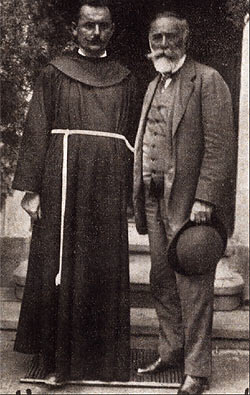 2
Didak Buntić was a Franciscan friar and educator from Bosnia and Herzegovina.
2
Didak Buntić was a Franciscan friar and educator from Bosnia and Herzegovina.
Sima Milutinović Sarajlija
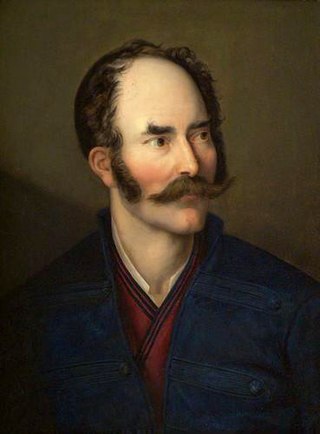 2
Simeon "Sima" Milutinović "Sarajlija" was a poet, hajduk, translator, historian and adventurer. Literary critic Jovan Skerlić dubbed him the first Serbian romantist.
2
Simeon "Sima" Milutinović "Sarajlija" was a poet, hajduk, translator, historian and adventurer. Literary critic Jovan Skerlić dubbed him the first Serbian romantist.
Ljudevit Gaj
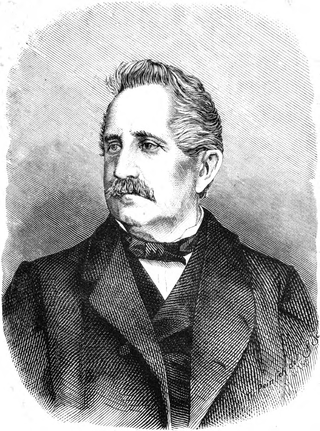 2
Ljudevit Gaj was a Croatian linguist, politician, journalist and writer. He was one of the central figures of the pan-Slavist Illyrian movement.
2
Ljudevit Gaj was a Croatian linguist, politician, journalist and writer. He was one of the central figures of the pan-Slavist Illyrian movement.
Husein Gradaščević
 2
Husein Gradaščević (Husein-kapetan) was an Ottoman Bosnian military commander who led an uprising against the Tanzimat, modernising political reforms in the Ottoman Empire. Born into a Bosnian noble...
2
Husein Gradaščević (Husein-kapetan) was an Ottoman Bosnian military commander who led an uprising against the Tanzimat, modernising political reforms in the Ottoman Empire. Born into a Bosnian noble...
Stepa Stepanović
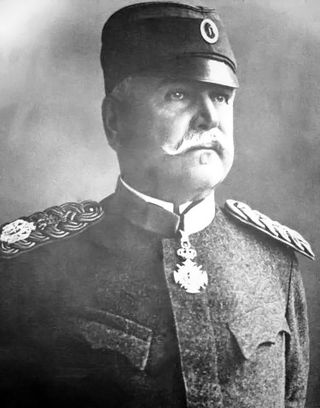 2
Stepan "Stepa" Stepanović was a Serbian military commander who fought in the Serbo-Turkish War, the Serbo-Bulgarian War, the First Balkan War, the Second Balkan War and World War I. Having joined the...
2
Stepan "Stepa" Stepanović was a Serbian military commander who fought in the Serbo-Turkish War, the Serbo-Bulgarian War, the First Balkan War, the Second Balkan War and World War I. Having joined the...
Milutin Milanković
 2
Milutin Milanković was a Serbian mathematician, astronomer, climatologist, geophysicist, civil engineer and popularizer of science.
2
Milutin Milanković was a Serbian mathematician, astronomer, climatologist, geophysicist, civil engineer and popularizer of science.
Vladimir Nazor
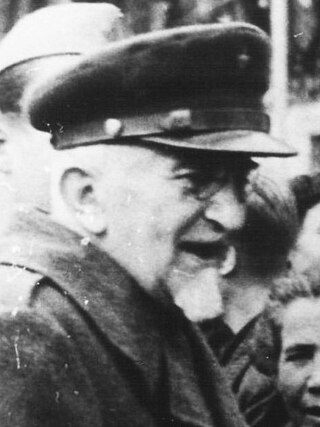 2
Vladimir Nazor was a Croatian poet and politician. During and after World War II in Yugoslavia, he served as the first President of the Presidium of the Croatian Parliament, and first Speaker of the...
2
Vladimir Nazor was a Croatian poet and politician. During and after World War II in Yugoslavia, he served as the first President of the Presidium of the Croatian Parliament, and first Speaker of the...
Ivo Lola Ribar
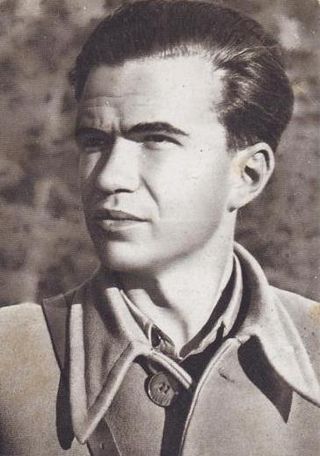 2
Ivan Ribar, known as Ivo Lola or Ivo Lolo, was a Yugoslav communist politician and military leader of Croatian descent. In the 1930s, he became one of the closest associates of Josip Broz Tito,...
2
Ivan Ribar, known as Ivo Lola or Ivo Lolo, was a Yugoslav communist politician and military leader of Croatian descent. In the 1930s, he became one of the closest associates of Josip Broz Tito,...
Nedim Filipović
 2
Nedim Filipović bio je jugoslavenski i bosanskohercegovački naučnik, intelektualac, orijentalista, filolog, turkolog, historičar-osmanista, redovni profesor na Filozofskom fakultetu u Sarajevu....
2
Nedim Filipović bio je jugoslavenski i bosanskohercegovački naučnik, intelektualac, orijentalista, filolog, turkolog, historičar-osmanista, redovni profesor na Filozofskom fakultetu u Sarajevu....
Himzo Polovina
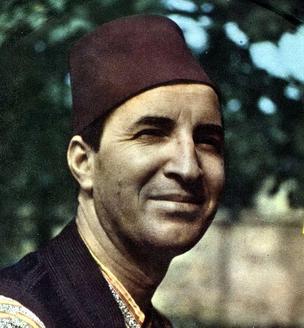 2
Himzo Polovina was a Bosnian singer and songwriter, and one of the most famous and widely revered folk and sevdalinka artists in the region. In addition, Dr. Himzo Polovina was a neuropsychiatrist by...
2
Himzo Polovina was a Bosnian singer and songwriter, and one of the most famous and widely revered folk and sevdalinka artists in the region. In addition, Dr. Himzo Polovina was a neuropsychiatrist by...
Cyril and Methodius
 2
Cyril and Methodius (815–885) were brothers, Byzantine Christian theologians and missionaries. For their work evangelizing the Slavs, they are known as the "Apostles to the Slavs".
2
Cyril and Methodius (815–885) were brothers, Byzantine Christian theologians and missionaries. For their work evangelizing the Slavs, they are known as the "Apostles to the Slavs".
Hrvoje Vukčić Hrvatinić
 2
Hrvoje Vukčić Hrvatinić was a medieval Bosnian nobleman and magnate, Grand Duke of Bosnia, Knez of Donji Kraji, and Duke of Split. He was the most prominent member of the Hrvatinić noble family, and...
2
Hrvoje Vukčić Hrvatinić was a medieval Bosnian nobleman and magnate, Grand Duke of Bosnia, Knez of Donji Kraji, and Duke of Split. He was the most prominent member of the Hrvatinić noble family, and...
Momo Kapor
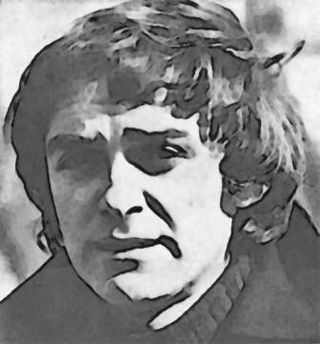 2
Momčilo "Momo" Kapor was a Serbian novelist and painter.
2
Momčilo "Momo" Kapor was a Serbian novelist and painter.
Hasan Kikić
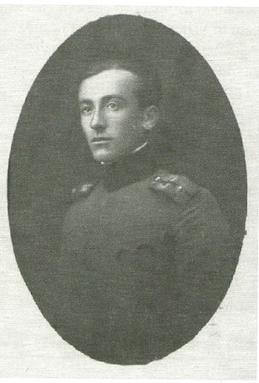 2
Hasan Kikić was a Bosnian literate and poet.
2
Hasan Kikić was a Bosnian literate and poet.
Branimir of Croatia
 2
Branimir was a ruler of Duchy of Croatia who reigned as duke from 879 to c. 892. His country received papal recognition as a state from Pope John VIII on 7 June 879. During his reign, Croatia...
2
Branimir was a ruler of Duchy of Croatia who reigned as duke from 879 to c. 892. His country received papal recognition as a state from Pope John VIII on 7 June 879. During his reign, Croatia...
Prince Marko
 2
Marko Mrnjavčević was the de jure Serbian king from 1371 to 1395, while he was the de facto ruler of territory in western Macedonia centered on the town of Prilep. He is known as Prince Marko and...
2
Marko Mrnjavčević was the de jure Serbian king from 1371 to 1395, while he was the de facto ruler of territory in western Macedonia centered on the town of Prilep. He is known as Prince Marko and...
Petar Mandić
 2
Petar Mandić, (1927–1999), pedagog i psiholog, član ANU BiH, član ANURS.
2
Petar Mandić, (1927–1999), pedagog i psiholog, član ANU BiH, član ANURS.
Milan Tepić
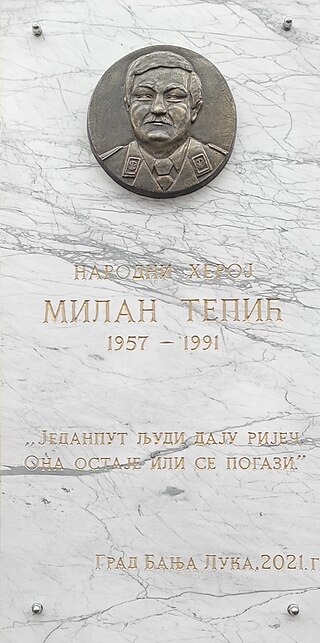 2
Milan Tepić was a major in the Yugoslav People's Army during the Croatian War of Independence.
2
Milan Tepić was a major in the Yugoslav People's Army during the Croatian War of Independence.
Svetozar Ćorović
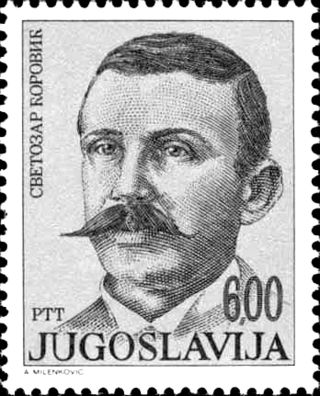 2
Svetozar Ćorović was a Serbian novelist from Bosnia and Herzegovina. In his books, he often wrote of life in Herzegovina and, more specifically, the city of Mostar. His brother was Vladimir Ćorović,...
2
Svetozar Ćorović was a Serbian novelist from Bosnia and Herzegovina. In his books, he often wrote of life in Herzegovina and, more specifically, the city of Mostar. His brother was Vladimir Ćorović,...
Зоран Боровина
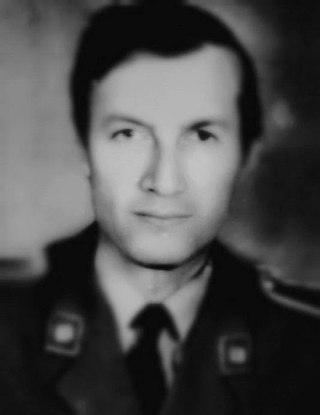 2
Зоран Боровина био је пуковник Војске Републике Српске.
2
Зоран Боровина био је пуковник Војске Републике Српске.
Hajduk Veljko
 2
Veljko Petrović, known simply as Hajduk Veljko, was one of the vojvodas of the Serbian Revolutionary forces in the First Serbian Uprising against the Ottoman Empire, in charge of the Negotin area. He...
2
Veljko Petrović, known simply as Hajduk Veljko, was one of the vojvodas of the Serbian Revolutionary forces in the First Serbian Uprising against the Ottoman Empire, in charge of the Negotin area. He...
Илија Бирчанин (пуковник)
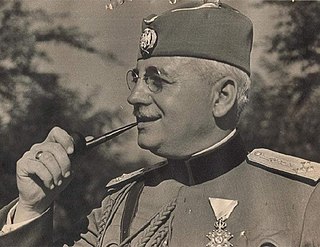 2
Илија Бирчанин био је српски и југословенски лекар, хирург, санитетски пуковник Југословенске војске и носилац Ордена Светог Саве. За време Другог светског рата је био припадник Српске државне страже.
2
Илија Бирчанин био је српски и југословенски лекар, хирург, санитетски пуковник Југословенске војске и носилац Ордена Светог Саве. За време Другог светског рата је био припадник Српске државне страже.
Miloš Obrenović, Prince of Serbia
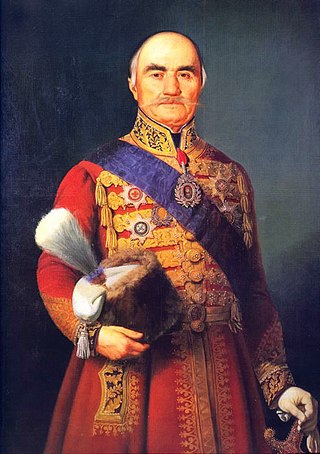 2
Miloš Obrenović born Miloš Teodorović, also known as Miloš the Great was the Prince of Serbia twice, from 1815 to 1839, and from 1858 to 1860. He was an eminent figure of the First Serbian uprising,...
2
Miloš Obrenović born Miloš Teodorović, also known as Miloš the Great was the Prince of Serbia twice, from 1815 to 1839, and from 1858 to 1860. He was an eminent figure of the First Serbian uprising,...
Stefan Lazarević
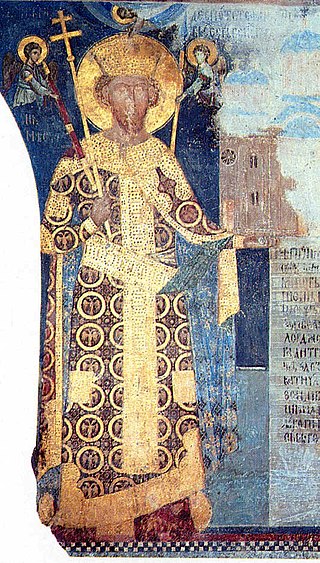 2
Stefan Lazarević, also known as Stefan the Tall, was a Serbian ruler as prince (1389–1402) and despot (1402–1427). He was also a diplomat, legislator, ktetor, patron of the arts, poet and one of the...
2
Stefan Lazarević, also known as Stefan the Tall, was a Serbian ruler as prince (1389–1402) and despot (1402–1427). He was also a diplomat, legislator, ktetor, patron of the arts, poet and one of the...
Basil of Ostrog
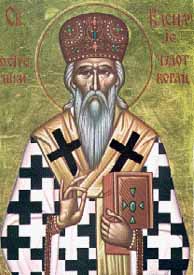 2
Basil of Ostrog, also known as Vasilije, was a Serbian Orthodox bishop of Zahumlje who is venerated as a saint in the Eastern Orthodox Church.
2
Basil of Ostrog, also known as Vasilije, was a Serbian Orthodox bishop of Zahumlje who is venerated as a saint in the Eastern Orthodox Church.
Dobrica Ćosić
 2
Dobrica Ćosić was a Yugoslav and Serbian politician, writer, and political theorist.
2
Dobrica Ćosić was a Yugoslav and Serbian politician, writer, and political theorist.
Radoje Domanović
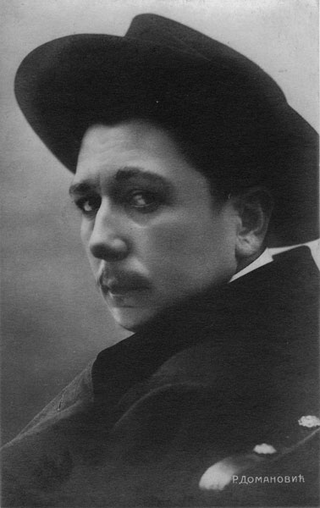 2
Radoje Domanović was a Serbian journalist, writer and teacher, most famous for his satirical short stories. His adult years were a constant fight against tuberculosis. This circumstance of his life,...
2
Radoje Domanović was a Serbian journalist, writer and teacher, most famous for his satirical short stories. His adult years were a constant fight against tuberculosis. This circumstance of his life,...
Вид Њежић
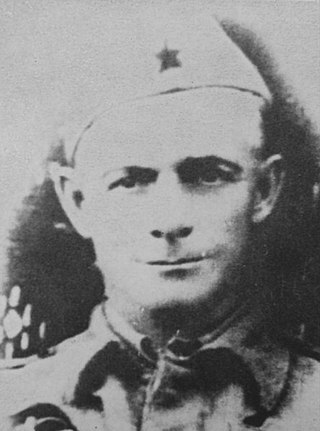 2
Вид Њежић био је обућарски радник, учесник Народноослободилачке борбе и народни херој Југославије.
2
Вид Њежић био је обућарски радник, учесник Народноослободилачке борбе и народни херој Југославије.
Hazim Šabanović
 2
Hazim Šabanović was a Bosniak and Yugoslav historian, orientalist, and Ottomanist. He was Scientific advisor of the Oriental Institute in Sarajevo. He died in Istanbul, where he was searching for new...
2
Hazim Šabanović was a Bosniak and Yugoslav historian, orientalist, and Ottomanist. He was Scientific advisor of the Oriental Institute in Sarajevo. He died in Istanbul, where he was searching for new...
August Šenoa
 2
August Ivan Nepomuk Eduard Šenoa was a Croatian novelist, playwright, poet, and editor. Born to an ethnic German and Slovak family, Šenoa became a key figure in the development of an independent...
2
August Ivan Nepomuk Eduard Šenoa was a Croatian novelist, playwright, poet, and editor. Born to an ethnic German and Slovak family, Šenoa became a key figure in the development of an independent...
Đoko Mazalić
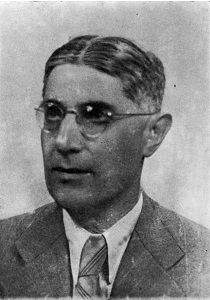 2
Đoko Mazalić bio je bosanskohercegovački slikar srpskog podrijetla. Jedan je od slikara iz prve generacije umjetnika koji su pohađali umjetničke škole, uključujući i Gabrijela Jurkića, Petra...
2
Đoko Mazalić bio je bosanskohercegovački slikar srpskog podrijetla. Jedan je od slikara iz prve generacije umjetnika koji su pohađali umjetničke škole, uključujući i Gabrijela Jurkića, Petra...
Nikola IV Zrinski
 2
Nikola IV Zrinski or Miklós IV Zrínyi, also commonly known as Nikola Šubić Zrinski, was a Croatian nobleman and general, Ban of Croatia from 1542 until 1556, royal master of the treasury from 1557...
2
Nikola IV Zrinski or Miklós IV Zrínyi, also commonly known as Nikola Šubić Zrinski, was a Croatian nobleman and general, Ban of Croatia from 1542 until 1556, royal master of the treasury from 1557...
Izet Nanić
 2
Izet Nanić was a Bosnian Army brigade commander during the Bosnian War of Independence in Bosnia and Herzegovina.
2
Izet Nanić was a Bosnian Army brigade commander during the Bosnian War of Independence in Bosnia and Herzegovina.
Vojislav Ilić
 2
Vojislav Ilić was a Serbian poet, known for his finely chiseled verse. His poetry exemplifies a classic example of modern Serbian language and features the standard Decadent motifs of the epoch:...
2
Vojislav Ilić was a Serbian poet, known for his finely chiseled verse. His poetry exemplifies a classic example of modern Serbian language and features the standard Decadent motifs of the epoch:...
Milovan Glišić
 2
Milovan Glišić was a Serbian writer, dramatist, translator, and literary theorist. He is sometimes referred to as the Serbian Gogol.
2
Milovan Glišić was a Serbian writer, dramatist, translator, and literary theorist. He is sometimes referred to as the Serbian Gogol.